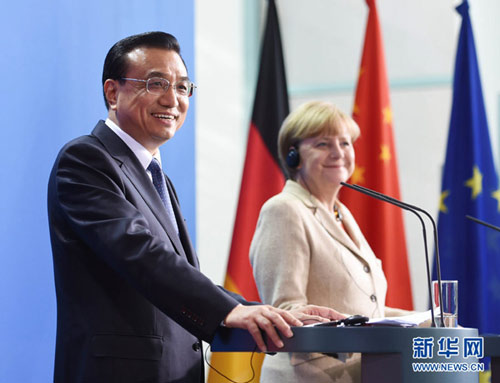当前位置: Language Tips> 双语新闻
German, Chinese leaders meet amid gloomy economic backdrop

|
The third German-Chinese ministerial consultations are due to be held in Berlin. They come amid growing concerns over Europe's faltering economy and an economic slowdown in China. When Chinese Prime Minister Li Keqiang arrives in Germany for high-level consultations beginning Friday, it will be amidst a mixed background of flourishing trade between the two economic powerhouses but gloomy forecasts for their growth. Li will hold talks with German Chancellor Angela Merkel and sign a number of agreements. The two leaders will also preside over a joint meeting of their cabinets. Bilateral trade between the two countries has jumped nearly 12-fold in recent years, according to official data. But elation over the Sino-German trade boom has been dampened by a slowdown in the Chinese economy and warnings that Germany is teetering on the brink of recession. "The Chinese economy is now not strong enough to offset stagnation in the eurozone," said Carsten Brzeski, an economist with ING Bank. Domestic demand in China has slipped. Imports dropped 3 percent in August over July and as a result Germany no longer looks like it will be able to prop up the eurozone economy like it did when it led the Continent out of the 2009 recession. On Thursday, Germany's Federal Statistics Office marked the sharpest monthly drop in exports in five years. There have also been declines in industrial production, factory orders and business confidence. What seemed years ago to be an insatiable Chinese demand for high-end products from Germany has since slowed as China no longer registers the whopping, double-digit growth rates it once did. The International Monetary Fund even forecast this week growth in China could slow to 7.1 percent by next year. Yet China is still Germany's third largest trading partner. In 2013, bilateral trade topped 140 billion euros ($178.1 billion) - up from 12 billion euros in 1993. Outside Europe, China was the second most important market for German exports, behind the United States. And some only expect that number to go up. "We are counting on 2014 being a record year for bilateral trade," China's ambassador to Germany, Shi Mingde, said earlier this month. But Shi also voiced concern over falling European demand for goods produced in China as geopolitical tensions around the world have unnerved investors and caused business confidence to drop. Pro-democracy demonstrations in Hong Kong, the ongoing conflict in Ukraine, rapid advances by Islamic State militants in Iraq and Syria and the outbreak of the deadly Ebola virus have spoiled appetites for loans and investment the world over. "We don't want the entire EU to dip into a recession," Shi said. "At the moment, we're feeling lower demand from Europe - that's a problem for us." While Li and Merkel convene in Berlin, around 550 business leaders will gather in the northern German port city of Hamburg for the sixth biennial "China meets Europe" summit, where Li will also make a speech. More Chinese companies are based there than in any other German or European city and perhaps nowhere else are the effects of Germany's slowing mercantile relationship with China more apparent. This month, a German court postponed a ruling on deepening the channels leading to Hamburg's ports - a major blow to a city eager to accommodate a new generation of Chinese container ships. |
据德国之声网站10月9日报道,第三次中德部长级磋商将在德国首都柏林召开。此时,整个欧洲经济摇摇欲坠,而中国经济增速也在放缓,让外界愈发担忧。 在中德这两大经济强国的双边贸易繁荣,而对两国经济增长预期却走低的复杂背景下,中国总理李克强于抵达德国,并参加在10日与德方的高级磋商。 李克强将与德国总理安吉拉·默克尔会谈,签署多份合作协议。两位领导人还将共同主持中德政府联席会议。 据官方数据,近年来,中德两国的双边贸易总额几乎翻了12倍,但这份喜悦却被中国经济增速减慢和德国经济摇摇欲坠的严峻现实所冲淡了。 “目前中国经济还不够强大,难以抵消欧元区经济衰退的负作用,”荷兰商业银行(ING Bank)的经济学家卡斯滕·布列斯基(Carsten Brzeski)评论道。 中国内需下滑。德国今年8月的进口总额比7月环比下降3个百分点,因而德国也不太可能像先前领导欧洲大陆走出2009年经济萧条那样再度振兴欧元区经济, 9日,德国联邦统计局公布,德国8月出口总额创下了近5年来最大跌幅,此外工业产出、工厂订单量以及商业信心指数都有所下滑。 随着中国经济再也没能达到高达两位数的增长率,多年前中国对德国进口高端产品多多益善的高需求在今天则难以重现。 本周,国际货币基金组织甚至预测,中国明年的经济增速可能放缓至7.1%。 尽管如此,中国仍旧是德国的第三大贸易伙伴。2013年,中德两国双边贸易总额创下新高,达到了1400亿欧元(约1.09万亿元),而1993年仅为120亿欧元。此外,中国还是德国在欧洲之外的第二大出口国,仅次于美国,有人便期望中国能赶超美国。 中国驻德大使史明德在9月初也曾说道:“我们也期待2014年中德双边贸易能再创历史新高。” 不过,由于全球地缘政治局势紧张使得投资者备受打击,商业信心指数下挫,史明德也对欧洲市场对中国制品需求量的下降表示了担忧。香港的民主示威游行,乌克兰愈演愈烈的冲突,伊斯兰激进分子在伊拉克和叙利亚的快速挺进,以及致命病毒埃博拉的爆发,让全球对贷款和投资都兴味索然。 “我们也不希望看到整个欧洲都跌进经济衰退的泥沼里,”史明德说。“不过目前,我们对欧洲的需求也在下降——这对我们来说也是一个问题。” 在两国总理柏林会谈的同时,大约550家企业领导将聚集在德国北部港口城市汉堡参加第六届(每两年一届)汉堡峰会“中国与欧洲相遇”,届时李克强总理也将出席并发表演讲。 驻扎在汉堡的中国企业比在德国或欧洲其它城市的都要多,或许也没有哪个地方能比汉堡更能体现中德贸易关系减弱给两国带来的影响了。 9月,德国法院还推迟了对汉堡港疏浚工程诉讼案的裁决——这对这个亟需容纳新一代中国大型集装箱船的港口城市无疑是一个重大打击。 (译者 bupt_liaoshan 编辑 丹妮) 扫一扫,关注微博微信
 
|
上一篇 : 希拉里谈弱点:难以拒绝帅哥
下一篇 : “这是性犯罪”:詹妮弗•劳伦斯首次回应艳照泄露事件
关注和订阅


电话:8610-84883645
传真:8610-84883500
Email: languagetips@chinadaily.com.cn